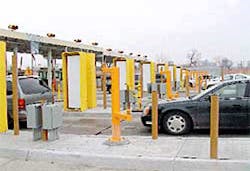The Canadian Trucking Alliance (CTA) warned of staggering backlogs to get drivers certified for border crossing may result in a trade bottleneck. CTA has urged the U.S. Customs and Border Protection (CBP) agency to extend deadlines for driver screening as it implements its advance electronic cargo information requirements under the U.S. Trade Act.
These rules require carriers to submit an electronic cargo manifest to CBP an hour to a half-hour before arriving at the border. Carriers with shipments that qualify for the Free and Secure Trade (FAST) program may submit an e-manifest no less than a half-hour in advance.
See Customs sets e-manifest compliance dates.
Truck drivers using the line release program, Border Release Advanced Screening and Selectivity (BRASS), would be denied entry to the U.S. if they aren’t registered in the FAST program by Jan. 30. But CTA noted that customs officials are “flooded” with applications and as a result it is likely there won’t be enough certified drivers to move goods across the U.S.-Canada border under BRASS.
“It is our understanding that around 70,000 of the 87,000 or so drivers involved in cross-border trucking have applied for FAST registration,” said CTA CEO David Bradley. “But to date, less than 30,000 of those drivers have completed the process, leaving over 40,000 drivers at various stages of processing. Since it is presently taking 8 to 12 weeks to fully process an application, the potential for a serious disruption to trade is very real.”
The “required advance electronic presentation of cargo information for truck carriers” rules under the Trade Act of 2002 came into effect across 40 Ports of Entry in New York, Michigan, Washington, Texas, New Mexico, Arizona and California on Nov. 15, 2004. The rules will be fully implemented across a total of 99 Ports of Entry by Mar. 29, 2005.
Carriers operating under the BRASS program are required to comply with the rules under the last phase (of three) of implementation of the rules.
“CBP recognizes that a backlog exists for FAST card applications,” stated the agency. “Subsequently, CBP is allowing enough time to elapse prior to initiating enforcement actions.”
However, CBP also noted that any truck that is noncompliant seeking entry will be denied after the Jan. 30 deadline.
For a FAQ on the e-manifest implementation rules on CBP’s website, click here.
Additionally, CTA has criticized the agency’s non-compliance penalty because carriers could potentially be penalized for e-manifest submission delays by custom brokers.
“Carriers should not have to bear the cost of other parties’ mistakes,” Bradley said.
